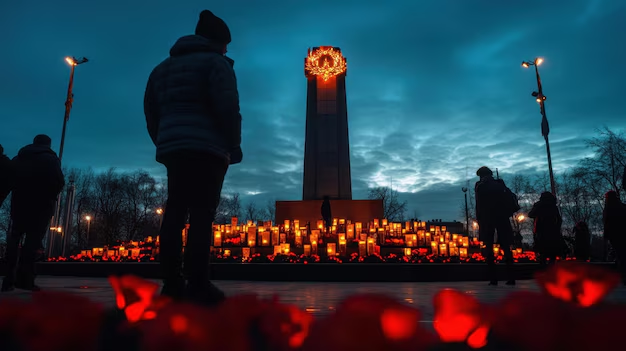Day of Remembrance and Respect to Victims of the Communist Regime
“10 Sobering Facts About the Day of Remembrance for Victims of Communism”
The Day of Remembrance and Respect to Victims of the Communist Regime is a solemn occasion observed annually on February 1st in several countries that endured communist rule. This day honors the millions who suffered under oppressive regimes, paying tribute to those who lost their lives, freedoms, and dignity in the fight for justice, liberty, and human rights.
1. Why February 1st Day of Remembrance for Victims of Communism?
February 1st holds historical significance in many nations where communist regimes committed atrocities. The date varies slightly depending on the country, but the overarching theme remains the same: to reflect on the consequences of totalitarianism and to remember the sacrifices of those who resisted.
2. The Legacy of Communist Regimes
Communist regimes emerged in the 20th century, promising equality and prosperity. However, these governments often devolved into authoritarian states characterized by:
- Mass Executions: Political purges, such as Stalin’s Great Terror, resulted in the deaths of millions.
- Forced Labor Camps: Gulags and similar camps subjected individuals to inhumane conditions.
- Suppression of Freedoms: Free speech, religion, and dissent were brutally suppressed.
- Famine and Economic Collapse: Policies like Mao’s Great Leap Forward led to widespread famine and suffering.
3. The Purpose of the Day
The Day of Remembrance and Respect serves multiple purposes:
- Honoring Victims: Commemorating the lives lost to executions, forced labor, starvation, and persecution.
- Preserving History: Educating future generations about the realities of communist regimes to prevent similar tragedies.
- Promoting Freedom: Advocating for democracy, human rights, and the rule of law as safeguards against authoritarianism.
4. How People Observe This Day “Day of Remembrance for Victims of Communism”
The day is marked by various activities that foster reflection, education, and remembrance:
- Memorial Ceremonies: Events at monuments, cemeteries, or museums dedicated to victims of communism.
- Candlelight Vigils: Lighting candles to symbolize hope and the enduring spirit of those who suffered.
- Educational Programs: Lectures, documentaries, and discussions about the history and consequences of communist rule.
- Moment of Silence: Observing a minute of silence to honor the victims.
- Social Media Awareness: Sharing stories, historical facts, and reflections to reach a wider audience.
5. FAQs About the Day of Remembrance and Respect
Q: Is this day recognized globally?
A: While not a global holiday, many countries with histories of communist oppression, such as Hungary, Poland, and the Czech Republic, observe similar days.
Q: What’s the connection between this day and International Human Rights Day?
A: Both days emphasize the importance of protecting human rights and remembering the cost of losing them under oppressive regimes.
Q: Why focus on victims of communism specifically?
A: The day highlights the unique atrocities of communist regimes while complementing broader remembrances for victims of all forms of totalitarianism.
6. The Human Cost of Communist Regimes “Day of Remembrance for Victims of Communism”
Communist governments left a devastating toll:
- The Soviet Union: An estimated 20 million died under Stalin’s rule due to purges, forced labor, and famine.
- China: Tens of millions perished during the Great Leap Forward and the Cultural Revolution.
- Cambodia: The Khmer Rouge killed nearly a quarter of the population in one of the 20th century’s most brutal genocides.
- Eastern Europe: Political prisons, secret police, and executions were widespread during the Cold War era.
7. Why This Day Matters Today “Day of Remembrance for Victims of Communism”
As memories of the 20th century fade, it becomes increasingly vital to remember the lessons of history. This day serves as a stark reminder of the dangers of authoritarianism and the value of freedom, democracy, and human dignity.
8. How to Get Involved “Day of Remembrance for Victims of Communism”
If you want to honor this day, consider these actions:
- Support Human Rights Organizations: Donate or volunteer with groups advocating for freedom and justice worldwide.
- Learn and Share Stories: Read survivor memoirs and share them to keep their memories alive.
- Visit Memorials or Museums: Many cities have dedicated spaces to educate visitors about the atrocities of communist regimes.
- Engage in Dialogue: Discuss the impact of totalitarianism with family, friends, or in community forums.
9. The Resilience of the Human Spirit “Day of Remembrance for Victims of Communism”
While the Day of Remembrance highlights tragic events, it also honors the resilience of those who survived and resisted. Their stories inspire future generations to value freedom and stand against oppression.
10. Looking Forward with Hope “Day of Remembrance for Victims of Communism”
The Day of Remembrance and Respect to Victims of the Communist Regime is not just about looking back—it’s about building a future where such atrocities are impossible. By remembering the past, we commit to promoting peace, justice, and human rights for all.
Conclusion
The Day of Remembrance and Respect to Victims of the Communist Regime is a poignant reminder of the cost of freedom and the importance of vigilance in protecting it. Through education, reflection, and action, this day ensures that the sacrifices of those who suffered under communist regimes are never forgotten and that their legacy serves as a foundation for a freer, more just world.
Share this content:
